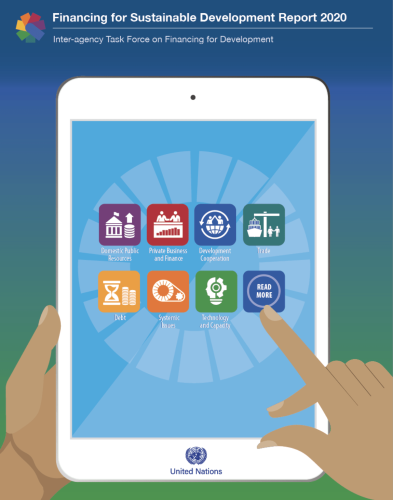UN and 60 International Agencies Release Financing for Sustainable Development Report 2020

Categories :
Financing for Sustainable Development Report 2020
Press release (9 April 2020):
60 International Agencies Urge Rapid, Coordinated Response As Pandemic Threatens to Destabilize Poor Countries’ Finances
With all challenges going on in the world governments must take immediate steps to prevent a potentially devastating debt crisis and address the economic and financial havoc wrought by the COVID-19 pandemic – says a new report from the United Nations-led Inter-Agency Task Force on Financing for Development.
The UN System’s 2020 Financing for Sustainable Development Report outlines measures to address the impact of the unfolding global recession and financial turmoil, especially in the world’s poorest countries. Its recommendations are based on joint research and analysis from the UN System, the International Monetary Fund, World Bank Group, and more than 60 UN agencies and international institutions.
Even before the outbreak of COVID-19, one in five countries – home to billions of people living in poverty – were likely to see per capita incomes stagnate or decline in 2020. Now, billions more are likely to be affected as governments struggle to cope with the pandemic.
“The global community was already falling behind in efforts to end poverty, take climate action and reduce inequalities,” said Deputy Secretary-General of the United Nations Amina Mohammed. “COVID-19 is the first of its kind development emergency and all countries must rise to the challenge to save lives and safeguard livelihoods in our response and recovery. We have one chance to build back better together for people and for the planet.”
“The global community was already falling behind in efforts to end poverty, take climate action and reduce inequalities,” said Deputy Secretary-General of the United Nations Amina Mohammed. “COVID-19 is the first of its kind development emergency and all countries must rise to the challenge to save lives and safeguard livelihoods in our response and recovery. We have one chance to build back better together for people and for the planet.”
Full report:
Overview only (pdf)
Full text (pdf)
The global economic recession and financial turmoil from COVID-19 are derailing implementation of the Addis Ababa Action Agenda and achievement of the Sustainable Development Goals (SDGs). Even before the pandemic, the 2020 Financing for Sustainable Development Report (FSDR) of the Inter-agency Task Force noted that there was backsliding in many areas. Due to the COVID-19 crisis, global financial markets have witnessed heavy losses and intense volatility. Particularly worrisome is the prospect of a new debt crisis. The FSDR highlights both immediate and longer-term actions, including arresting the backslide, to respond to the COVID-19 crisis.
The FSDR calls for:
A globally coordinated stimulus package, including reversing the decline in aid and increased concessional finance.
To prevent a debt crisis: Immediately suspending debt payments from poor countries.
Beyond the crisis, reassess debt sustainability/revisit existing mechanisms.
To stabilize financial markets by continuing to inject liquidity:
In the medium-term, explore regulatory frameworks to limit over-borrowing for non-productive investments, such as repaying shareholders.
Partnering with the private sector:
In the short term, banks to roll over debt to SMEs and individuals that are cash strapped.
In the medium-term, promote sustainable investment.
Building back better for sustainable development:
Public and private investment in sustainable development including in resilient infrastructure.
Strengthening social protection systems.
Investment in crisis prevention, risk reduction and planning.
Eliminate trade barriers and restrictions that affect supply chains.
Digital transformation is critical for the world society and economy and digital enable technologies present tremendous potential for the SDGs. However the COVID-19 Coronavirus pandemic has underlined major challenges and risks.
Public policies should be adjusted to fully exploit their potential, while addressing exclusion and risks of discrimination, and ensuring benefits for society at large, including decent jobs.
The 2020 FSDR begins with an analysis of the extremely challenging global macroeconomic context (chapter I). The thematic chapter (chapter II) analyses financing sustainable development in an era of transformative digital technologies. The remainder of the report (Chapters III.A to III.G and IV) discusses progress in the seven action areas of the Addis Agenda, and presents policy options at the national and international level.
The 2020 FSDR is the fifth report on implementing the Financing for Development outcomes and the means of implementation of the SDGs since the adoption of the 2030 Agenda and the Addis Ababa Action Agenda.
The assessment draws on the expertise, analysis and data from more than 60 agencies and international institutions that make up the Task Force, which is led by UN DESA and includes the World Bank Group, the International Monetary Fund and the World Trade Organisation, UNCTAD and UNDP in leading roles.
Chapters:
Chapter I: The global economic context and its implications for the Sustainable Development Goals
Chapter II: Financing sustainable development in an era of transformative digital technologies
Chapter III.A: Domestic public resources
Chapter III.B: Domestic and international private business and finance
Chapter III.C: International development cooperation
Chapter III.D: International trade as an engine for development
Chapter III.E: Debt and debt sustainability
Chapter III.F: Addressing systemic issues
Chapter III.G: Science, technology, innovation and capacity-building
Chapter IV: Data, monitoring and follow-up
Policy Notes:
Corona crisis causes turmoil in financial markets
Additional Materials:
FSDR 2020 slides.pdf
The global economic recession and financial turmoil from COVID-19 are derailing implementation of the Addis Ababa Action Agenda and achievement of the Sustainable Development Goals (SDGs). Even before the pandemic, the 2020 Financing for Sustainable Development Report (FSDR) of the Inter-agency Task Force noted that there was backsliding in many areas. Due to the COVID-19 crisis, global financial markets have witnessed heavy losses and intense volatility. Particularly worrisome is the prospect of a new debt crisis. The FSDR highlights both immediate and longer-term actions, including arresting the backslide, to respond to the COVID-19 crisis.
Sources: https://developmentfinance.un.org/fsdr2020
Citiesabc was created by a team of global industry leaders, academics and experts to create new solutions, resources, rankings and connections for the world’s top cities and populations.










